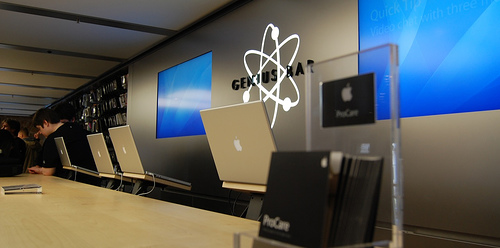
Used with permission. CC 2.0: the tartanpodcast.
Wanna know why I keep drinking the Apple Kool-Aid? Here's why.
My MacBook Pro died on Friday. One moment it was working fine. The next it presented me with a black, unpowered screen, and that was that. No amount of CPR, religious ceremony, or offers of inappropriate favors would wake it back up.
That happens. So I made an appointment for the next morning with my local Genius Bar at the Stoneridge Mall in Pleasanton, CA.
When I walked in, a cordial, efficient, knowledgeable, friendly, sorta granola-looking fellow named Ben called my name, punctual to the second. Ben let me know that their database system was down, so he couldn't look up any customer information or open a repair ticket, but he'd help me anyway. I found that confidence reassuring.
I had my kids in tow, and sat them down at an available machine right by the Genius Bar, where they could play Lego Batman to their hearts' content. The Apple Store is a Feng Shui paradise of form, function, and elegant simplicity, much like the products they build. Generous lighting, products on display, maximum staff, and minimal distraction. Even the bags are hidden out of view. (I was once quite surprised by the magic trick when one appeared for my purchase, materializing from under a table. Witchcraft, I tell you!)
Ben ran a quick test (amazing, given that I thought my system was D.O.A.) and confirmed the worst: it wasn't a known NVIDIA problem (which would be covered under a recall even if my system was out of its service contract). It was something more sinister. Alas, said I, I'm not sure I'm still covered under AppleCare.
No matter, he reassured. They'd get back to me on Monday with an assessment of the issue and a confirmation of whether or not I would have to bear the cost of the repair.
This evening, I found my paperwork. Turns out that AppleCare policies are sold in 3-year increments. I'm covered until next summer! I don't even need to wait for the phone call tomorrow.
Whether I'm right or wrong, you know what I think I'd get if this were a PC? I think I'd get a runaround. I think I'd be treated like one of several million problems that they hope will go away. I don't want to be treated like that!
Here's what you need to do to make a loyal customer out of Jeff Holton:
- Offer superior quality product.
I don't shop for the lowest cost. And I'm pretty sure I'm not the only one. Line up three products for me and the first thing I'll do is focus my attention on the middle-priced one. I figure the lowest-priced one has substandard workmanship and the highest-priced one is trying to pull a fast one on me.
But I trust Apple. They're all confident. Not cocky. Confident. They build a product that works. They seem as surprised as everyone else at how great it is. - Present sincere customer support.
Be honest. Ben didn't say, "I'll get back to you today and it'll be done tomorrow." He said the system was down and he'd help me. I was given realistic expectations.
He also acted like he wanted to get my problem solved, like it was his problem too. He took it personally. - Exist for the convenience of the customer.
Have you ever been helped by someone who was so full of themselves that you felt like a third wheel when there were only the two of you in the room? I don't ask for help so I can be impressed by someone. I ask for help because I need help.
If your primary motivating factor can be shifted away from trying to impress everyone with your brilliance to trying to meet a need, then you've got a successful business plan in your pocket.
Putting workstations for the children right by the counter when the parents are irate and the kids are bored isn't primarily about generating sales, although it may certainly have that added effect. It's about maintaining the sanity of customers who are already on edge, because they wouldn't be standing there unless they'd lost data or were dissatisfied with their purchase. - Know your stuff.
Yes, confidence can be faked (which would violate the second point), but without it, you're not going to give any warm and happy feelings to your customer. If you can't reassure them with good news, at least be able to let them know you have a good plan!
These genius folks know what to look for, how to get it, and how make sure they look like they know what they're doing.
Do they sweat? Not that I noticed.
You think I'll buy another Apple product one of these days? Oh, heck yeah. You would too if you'd received the same consistently excellent customer support that I have.